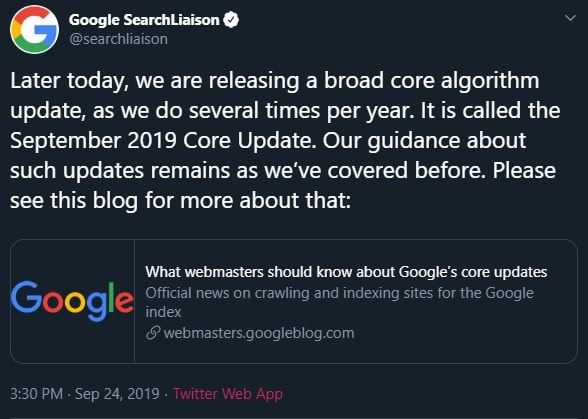For all of you who haven’t heard it already, Google announced a new “broad core algorithm update” roll-out at the end of September 2019, on the 25th.
It is not the first time they do this for this kind of algorithm update, yet this algorithm is already carefully analyzed by the SEO gurus worldwide, as it is one which is believed to produce some chaos within the SERPs.
Are you concerned about how this algorithm could affect your website as well? Just read this article to understand more about the way Google is constantly improving and updating its algorithms.
The history of Google Algorithm Updates
Google started updating its core algorithm in 2000, when the search giant introduced its browser bar and along with it the update they called “Toolbar PageRank”. That one displayed the authority of the websites and this is where all the SEO frenzy started.
After this moment there was a long tail of updates which tried to clean up the search engine from all those “smart guys” who optimized by spamming, over-linking, misleading users to other websites, tricking them into checking dubious links, click-baiting, writing content with the same color as the background for tricking the Google bots into reading something else than the human eye, all the dirty tricks of the trade.
Anyway, along with sanctioning the webmasters who optimized this way, Google also introduced updates that dealt with positive factors, such as social signals, page load speed, the time spent by users on the page and comprehensive content. In other words, with some of the factors, Google takes into consideration when ranking any given page.
Thus, in February 2011, Google introduced Panda (Farmer) which was the first major update that dealt with content farms, the practice which is since penalized by Google. Panda hit at that moment 12% of the search results, which is huge, and since then its versions hit even more websites.
After countless other updates, in April 2012 Google rolled-out another major update, called “Penguin”, which hit the over-optimized websites and the spammy practices, including keyword stuffing. Those who simply filled the content with lots of the targeted keywords were hit by this update.
According to Google there were affected almost 3.1% of the English searches, which was a lot at that moment, as some of the most well-positioned websites suffered after this Google update.
In August 2014 another update was rolling-out affecting all the websites which were not SSL secured. This update, although important, had no huge impact, but it is still in action and Google favors websites with https and not those with Http. Yet, if you still don’t have an SSL certificate, you probably haven’t noticed a serious drop in rankings following this update.
“Mobilegeddon” was another Google update, rolled-out in 2015, which was previously announced by the search giant, yet it didn’t make so much trouble in spite of the rumors. Mobilegeddon was intended to favor mobile-friendly websites over the others when it comes to mobile searches.
In April 2018, following the tendencies of the Google users to perform the searches on mobile more than on desktops, a new update rolled-out: Mobile-First Indexing update, which simply put the mobile version in front of desktop version when it comes to placing a specific site on SERPs. In other words, the way your website looked and behave on mobile did matter more than how it did on its desktop version. Later that year, in July, another Google algorithm affected the webmasters who haven’t optimized their mobile load speed.
Also, this year, there were lots of Google algorithm updates which, as we previously showed, affected some websites. Every now and then, Google reports or confirms an algorithm update, but most of the times there are SEO gurus who monitor the SERPs fluctuations and inform the community about them.
Google Algorithm Update – September 2019
This September Google rolled-out an update that was previously announced through a social media post by the giant.

This is quite rare from Google. Yes, they do roll-out more than 3000 updates each year, but for some of them, they do the announcement and confirm “it’s them” when we all see SERPs fluctuating.
This September update comes right after some other unconfirmed by Google major updates in June and July, and this means Google is reconsidering top results once again.
What should we expect? Anywhere between 1% and 3% of minimum affected websites, as it is seen as a major update.
What to do if you’re among the websites affected by this September Google update?
Google has given this August an important advice for all the webmasters following an important update. They simply said:
As explained, pages that drop after a core update don’t have anything wrong to fix. This said we understand those who do less well after a core update change may still feel they need to do something. We suggest focusing on ensuring you’re offering the best content you can. That’s what our algorithms seek to reward.
Said it another way, focus on offering the users the best experience when landing on your pages, such as a decent page load speed, comprehensive information, a good UX/UI design and fresh information by updating even the old content.
Let us put it into other words: Google say you have to do white, professional SEO.
That’s all.
